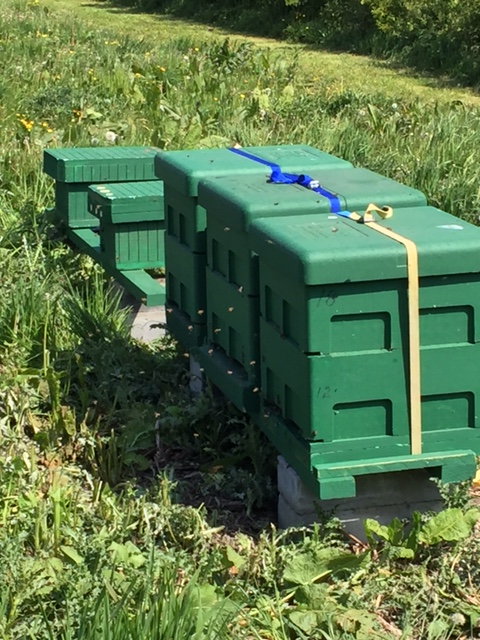







Honey Bee breeding
May 15, 2017
Breeding Hygienic Queen Bees
Bees are our most important pollinator, there are over 20,000 species of bees and they pollinated over a third of our crops and in doing so use the pollen as their protein and the nectar as their carbohydrate source, they are something we just can’t afford to lose but this is happening. There are no wild bees left in England
There are four main things causing the losses, Pesticides, Lack of Flower Landscape, Monoculture , Disease and Parasites
The main cause for the loss of British Honey Bee colonies is a parasite called Varroa. This parasite is the equivalent of humans having a parasite living on us the size of our fist, and through it bees are getting various viruses the main one being Deformed Wing Virus..It is very hard to treat and eradicate an insect living on an insect without causing damage to the host, and Varroa is evolving a resistance to the drugs used, plus any chemicals used in treating bees can leave a residue in honey and wax.
Over the last eleven years Professor Ratneiks at the Laboratory of Apiculture and Social Insects (LASI) at Sussex University has developed a strain of honey bee with hygienic behaviour that is a natural form of disease resistance. Hygienic worker bees uncap sealed cells and remove the diseased contents, hygienic behaviour whilst not eliminating the Varroa parasite does reduce the numbers very significantly by over 60%
An apiary has been set up at the Three Owls Reserve in Banks with LASI Bees. The Three owls reserve couldn’t be in a better position for Queen Breeding as being on the edge of the sea and the Ribble nature reserve this forms a 180 degree barrier against unwanted Drone bees ( the males), giving this reserve an excellent chance of pure mating.
No chemicals will be used on these bees to kill the Varroa mites, and it is hoped by breeding new queens from the best surviving stocks that bees once again will be able to care for their own colony health.
Colin Bridgwood May 2017
ADVICE
Wild Bird Advice and information
Many people would help birds more, if they knew simple easy ways in which they could help wild birds, without going to too-much extra trouble. Often there are ways to help – that don’t actually ‘cost’ anything at all, but can make a huge difference to making birds welcome and safe in the environment around us.
CITRUS FRUIT SAVES BIRDS LIVES
One of the main causes of bird injuries (espec
LATEST NEWS
-
At Last baby barn owls!!
Two Barn owls fleging right by the Meadow Reserve, HURRAH! Three Owls bought this special nest box for a local farmer Th
August 19, 2025 -
Outgoing meets incoming!
I was at Three Owls Wood in Tarleton today, having collected three carriers-full of rehabilitated birds from Meltham Wil
August 17, 2025 -
August in The Meadow
Best year ever for butterflies here and it makes me so very happy! I like to think our work is paying off. Certainly pla
August 2, 2025 -
New guidance reaps huge rewards
I have been using a different method of assistance this year via the Helpline, as around 80% of the calls are from the n
July 27, 2025 -
2025 Manchester to Blackpool Bike Ride Report
Well it's that time again, when I pen my account of the annual bike event which I've now taken part in for 36 consecut
July 19, 2025





